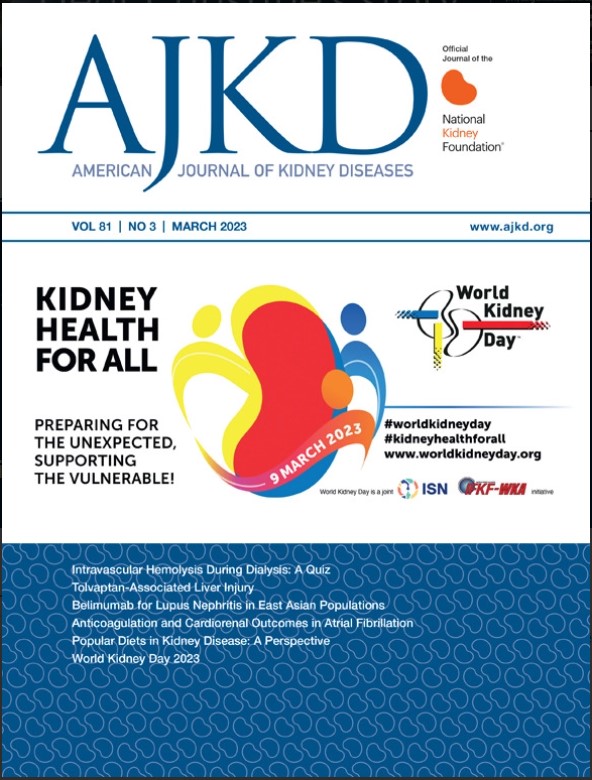晚期肾脏病患者停用二甲双胍与继续使用二甲双胍:一项全国范围的苏格兰目标试验模拟研究。
IF 8.2
1区 医学
Q1 UROLOGY & NEPHROLOGY
引用次数: 0
摘要
理由与目标:尽管缺乏支持性证据,但目前的指南建议肾功能损害晚期患者不要使用二甲双胍。这项观察性研究旨在比较2型糖尿病患者在发展到慢性肾脏病(CKD)4期(eGFR 2)后继续使用二甲双胍与停止使用二甲双胍的结果:全国观察性队列研究:研究设计:全国观察性队列研究。研究地点和参与者:苏格兰所有在2010年1月至2019年4月期间接受二甲双胍治疗的2型糖尿病和偶发4期慢性肾脏病成人患者。暴露:在偶发4期慢性肾脏病后6个月内停用二甲双胍与继续使用二甲双胍:主要结果为全因死亡率。次要结果包括主要不良心血管事件(MACE):分析方法:目标试验模拟,采用克隆张量加权设计和边际结构模型进行敏感性分析:在2019年4月30日前确诊为2型糖尿病的371,742名苏格兰居民中,有4,278人被确定为二甲双胍的普遍使用者,并出现了CKD 4期。在出现 CKD IV 期的 6 个月内,有 1713 人(40.1%)停用了二甲双胍。与继续服用二甲双胍相比,停用二甲双胍与较低的 3 年生存率相关(63.7%,95% CI 60.9 至 66.6 对 70.5%,95% CI 68.0 至 73.0;HR=1.26,95% CI 1.10 至 1.44),而两种策略的 MACE 发生率相似(HR=1.05,95% CI 0.88 至 1.26)。边际结构模型证实,停用二甲双胍与继续使用二甲双胍的患者全因死亡风险较高,MACE风险相似(全因死亡率:HR=1.34,95% CI 1.08至1.67;MACE:HR=1.04,95% CI 0.81至1.33):结论结论:当 eGFR 低于 30 ml/min/1.73m2 时,继续使用二甲双胍可能是合适的。需要进行随机对照试验来证实这些发现。本文章由计算机程序翻译,如有差异,请以英文原文为准。
Stopping Versus Continuing Metformin in Patients With Advanced CKD: A Nationwide Scottish Target Trial Emulation Study
Rationale & Objective
Despite a lack of supporting evidence, current guidance recommends against the use of metformin in people with advanced kidney impairment. This observational study compared the outcomes of patients with type 2 diabetes who continued versus stopped metformin after developing stage 4 chronic kidney disease (CKD) (estimated glomerular filtration rate [eGFR] < 30 mL/min/1.73 m2).
Study Design
Nationwide observational cohort study.
Setting & Participants
All adults with type 2 diabetes and incident stage 4 CKD in Scotland who were treated with metformin between January 2010 and April 2019.
Exposure
Stopping versus continuing metformin within 6 months following incident stage 4 CKD.
Outcome
Primary outcome was all-cause mortality. Secondary outcomes included major adverse cardiovascular events (MACE).
Analytical Approach
Target trial emulation with clone-censor-weight design and marginal structural models fit for sensitivity analyses.
Results
In a population of 371,742 Scottish residents with a diagnosis of type 2 diabetes before April 30, 2019, 4,278 were identified as prevalent metformin users with incident CKD stage 4. Within 6 months of developing CKD stage IV, 1,713 (40.1%) individuals discontinued metformin. Compared with continuing metformin, stopping metformin was associated with a lower 3-year survival (63.7% [95% CI, 60.9-66.6] vs 70.5% [95% CI, 68.0-73.0]; HR, 1.26 [95% CI, 1.10-1.44]), and the incidence of MACE was similar between both strategies (HR, 1.05 [95% CI, 0.88-1.26]). Marginal structural models confirmed the higher risk of all-cause mortality and similar risk of MACE in patients who stopped versus continued metformin (all-cause mortality: HR, 1.34 [95% CI, 1.08-1.67]; MACE: HR, 1.04 [95% CI, 0.81-1.33]).
Limitations
Residual confounding.
Conclusions
The continued use of metformin may be appropriate when eGFR falls below 30 mL/min/1.73 m2. Randomized controlled trials are needed to confirm these findings.
Plain-Language Summary
Current guidance recommends against the use of metformin in people with advanced kidney impairment despite a lack of evidence. It is therefore currently unclear how the decision to stop versus continue metformin in patients who reach stage 4 CKD impacts their risk of mortality and cardiovascular events. This study showed that stopping metformin after reaching stage 4 CKD was associated with reduced survival that did not appear to be mediated by an increase in adverse cardiovascular outcomes. These findings may support the continued use of metformin in patients with advanced kidney impairment, but further research is needed to confirm these observations.
求助全文
通过发布文献求助,成功后即可免费获取论文全文。
去求助
来源期刊

American Journal of Kidney Diseases
医学-泌尿学与肾脏学
CiteScore
20.40
自引率
2.30%
发文量
732
审稿时长
3-8 weeks
期刊介绍:
The American Journal of Kidney Diseases (AJKD), the National Kidney Foundation's official journal, is globally recognized for its leadership in clinical nephrology content. Monthly, AJKD publishes original investigations on kidney diseases, hypertension, dialysis therapies, and kidney transplantation. Rigorous peer-review, statistical scrutiny, and a structured format characterize the publication process. Each issue includes case reports unveiling new diseases and potential therapeutic strategies.
 求助内容:
求助内容: 应助结果提醒方式:
应助结果提醒方式:


